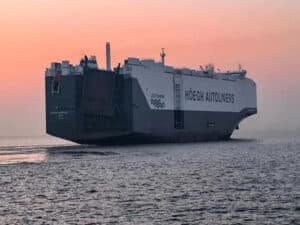
Op-Ed: Standardizing green finance for decarbonization investment
Written by Heather Ervin
Tuomas Riski, CEO of Norsepower talks green financing and decarbonization. (Credit: Norsepower)
By Tuomas Riski, CEO, Norsepower
The Global Maritime Fund’s Poseidon Principles has a huge number of signatories, which, together, have issued over $1.2 billion in sustainable maritime ship financing in 2020. Even in the first half of 2021, banks have issued almost $1 billion in Poseidon-linked debt, including new kinds of financial instruments beyond just loans.
Finance is changing, and business are aiming to be progressive, but the financial structures underpinning shipping’s environmental transition are still falling short in terms of scale and standardization to provide the clarity that ship operators need. This is especially the case for financing fleet upgrades, particularly the challenging aspects of retrofits, for vessels to meet new and future regulatory and ESG-driven standards.
When considering wind propulsion, the power and fuel savings and emissions reductions on board vessels will enable ships to achieve great climate alignment compliance scores, for example in EEXI and CII ratings whilst aligning with the requirements of the Poseidon Principles’ ship finance portfolios and Sea Cargo Charter clauses. Collectively the net result is that these savings can improve ships’ commercial competitiveness, trade utilization, and profitability on an annual basis, while also maintaining a fully regulatory compliant, attractive asset value.
RETROFIT FINANCE PACKAGES?
However, making changes on a vessel-by-vessel basis, is not quick enough. And, despite perceptions that banks are open to those with attractive green projects, retrofit finance packages have been few and niche, with a lack of large, mainstream financial institutions under-writing such longer-term investments. Similarly structuring favorable retrofit finance deals that satisfy the interests of lenders, ship owners and charterers has been an ongoing challenge that, theoretically, can be far more complex than the logistics of an installation itself.
We need to move on from the catch-22 situation; when clean technologies such as Rotor Sails become mainstream technologies in use onboard vessels, financiers will see it as less of a risk especially as the re-sale value of the asset will be clearer to see. But it seems like the only way that these will become the ‘norm’ will be through their incorporation in newbuild fleets. Quite simply, the timings don’t match with these coming on-stream and current vessels urgently needing upgrades to meet impending regulation.
Looking to our past for lessons learned, the financial deal structures created for retrofitting scrubbers onto vessels could be called the trailblazers in exploring environmentally-led lending and configuring complex security and payback options. These learnings could be adapted for wind propulsion and other clean technologies to identify more creative ways to share costs, manage investment security and re-balance split incentives.
ZERO EMISSIONS BY 2050
Charterers are beginning to incentivize the use of clean technology onboard vessels by guaranteeing longer term charter party agreements at attractive rates for owners who invest in preferred clean-tech. While the upfront capital costs are still significant, owners benefit from the assurance that they are locked into contracts to generate reliable revenues to pay back loans
Leaders of the banks within the Poseidon Principles alliance have highlighted that by early next year, they will be raising ambitions to align with the Paris agreement of zero emissions by 2050. This financial push from outside the IMO and EU will help make progress and broaden investment sources, and inevitably drive growth of investment too. Innovation in how deals are being structured and the packages available is welcome, but it must evolve from the fringes and become mainstream and standardized. Shipping needs transparent financial solutions with the scale and standardization to reflect the demand, and it needs to happen now.




